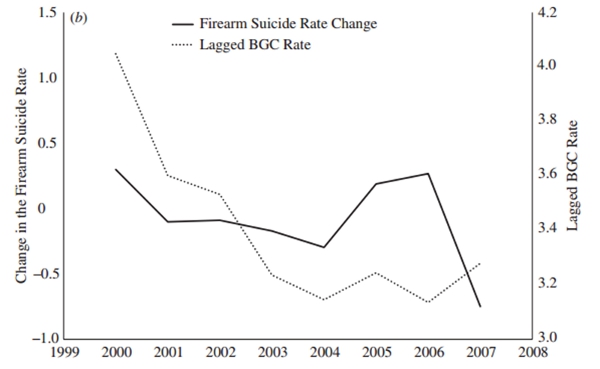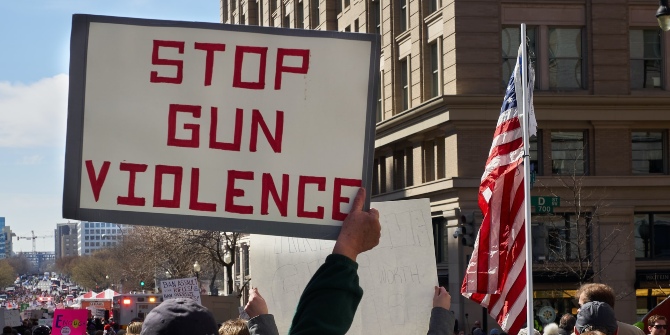 Monthly firearm background checks have been recorded in every US state since 1998, making it possible to explore whether changes in the availability of firearms in a state are related to its suicide rate. This relationship has been difficult to research in the past, as the fraction of suicides using firearms are a commonly used measure of firearms. Matthew Lang finds that increases in state background checks are associated with slight increases in the total suicide rate, suggesting that the increased availability of particular suicide method can lead to more suicides.
Monthly firearm background checks have been recorded in every US state since 1998, making it possible to explore whether changes in the availability of firearms in a state are related to its suicide rate. This relationship has been difficult to research in the past, as the fraction of suicides using firearms are a commonly used measure of firearms. Matthew Lang finds that increases in state background checks are associated with slight increases in the total suicide rate, suggesting that the increased availability of particular suicide method can lead to more suicides.
In the year following the Sandy Hook Elementary School shooting in Newtown, Connecticut, states throughout the US introduced approximately 1,500 bills on guns. Of the 109 that have become laws in the past year, 70 of the bills actually loosen gun restrictions. These looser laws tended to be in states where Republicans control the state legislature. The 39 passed bills that tightened gun restrictions tended to occur in Democratic controlled states. Even though most public polls show support for stricter background checks and firearm sales, the federal government has been unable to pass any laws on gun control, including stricter background check laws.
There are a number of possible reasons why the behavior of Congress members does not appear to coincide with the beliefs of their constituents. One reason is that voters that want stricter gun control laws vary significantly in how much control they want. Although a majority of American voters support stricter gun legislation, a larger majority opposes an outright ban of guns. With less cohesion among gun control supporters, politicians can cater to passionate minority gun owners to win their votes, but still keep some of the votes from the gun control supporters by siding with them on other issues they value more, such as education.

Another reason that gun control laws may have trouble passing, despite voter support, is because the causal effect of firearms is hard to determine. Historic measures of firearm availability at the state and local level have been difficult to obtain and past studies looking at the effect of firearms has relied on changes in laws or a variety of gun proxies to measure the role of firearms. Studies have mostly focused on the relationship between guns and crime, with a number of studies showing that looser gun laws are associated with less crime. A seemingly equal number of studies show that more guns lead to more crime using a variety of gun proxies.
Fewer studies have looked at the relationship between firearms and suicide, even though firearm suicide rates are higher than homicide firearm rates in nearly every state. The lack of research on the firearm-suicide relationship is due to the fact that one of the most commonly used measures for firearms in an area is the fraction of suicides that involve a firearm. To accurately explore the relationship between firearms and suicide, a new proxy for guns is necessary.
Firearm Background Checks
Since 1998, the FBI has required background checks for every firearm bought through a licensed dealer. The background checks involve a call to an FBI hotline which takes information about the buyer and the type of gun purchased. It is a quick process, usually taking two minutes. Most of the 2% of denials are because a potential buyer has been convicted of a felony, used illegal substances or had a restraining order placed on them. The shooter at Virginia Tech in 2007, Seung-Hui Cho, was able to buy a gun legally and passed a background check, even though he was declared mentally ill in 2005.
Monthly background checks in every state have been tracked by the FBI since its inception. The background checks measure the intention of an individual to purchase a firearm, something that past proxies have been unable to capture. Using the firearm background check data, I have been able to explore the relationship between changes in state background check rates and suicide rates.
Background Checks and Suicide
Using state level data between 1999 and 2007, my study shows that increases in the state background check rate are associated with a significant increase in firearm suicide in the current and following year. The total suicide rate increases insignificantly when background checks increase, suggesting that there is a weak ‘instrumentality effect’ where increased access to a particular method of suicide can potentially influence the decision to carry out a suicide, as is shown in Figure 1 below with reference to North Carolina.
Figure 1 – Background checks (BGC) and firearm suicides in North Carolina

I have controlled for a number of factors that influence suicide, including the unemployment rate, the insurance rate and the bankruptcy rate. Because the analysis looks at changes in state background checks over time, state-specific attributes related to suicide that do not change over time are controlled for. If one state is more ‘accepting’ of suicide than another because of an historical event or because of the general attitude in the state, this will not drive the results found in the analysis since those attributes do not change over time.
It may be possible that individuals are buying firearms with the intention of carrying out a suicide. This would mean that firearm purchases are driven by suicidal behavior. In order to address this concern, I have looked at youth suicide rates. If a youth obtains access to a firearm, they presumably have to be around someone who purchased a firearm and likely went through a background check. Youths themselves cannot go through a background check with the intention of carrying out a suicide. My analysis shows that increases in state background check rates by adults are associated with a significant increase the youth male firearm suicide rate and an insignificant increase in youth male suicide rates. This provides further evidence that access to firearms can increase the likelihood of suicide and the suicide is carried out using a firearm.
Although the background check data from the FBI measures the intention to purchase a firearm from a licensed dealer, they do not account for all firearms in a state. Not all gun shows require a background check. Neither do online purchases. Private sales and transfers across state lines are not accounted for with the background check data.
In April, 2013, a US Senate Bill was proposed that would have required more extensive background checks at gun shows and for online purchases. The bill was unable to get the 60 votes needed to move forward. According to the results of my study, passing such a bill could potentially decrease suicides in both adults and youth. Although suicide reduction was not the primary motivation behind the bill, limiting firearm access can have a significant impact on suicidal individuals. As Congress continues to debate gun policy, one of the potential consequences of their inaction, and the looser gun laws in many states, is more lives lost due to suicide.
This article is based on the paper, ‘Firearm Background Checks and Suicide’, in The Economic Journal.
Please read our comments policy before commenting.
Note: This article gives the views of the author, and not the position of USApp– American Politics and Policy, nor of the London School of Economics.
Shortened URL for this post: http://bit.ly/19KjwbN
_________________________________________
 Matthew Lang – Xavier University
Matthew Lang – Xavier University
Matthew Lang is an Assistant Professor of Economics at Xavier University. He is interested in applied microeconomics but his research focuses on mental health policy. His work has explored the role of firearms in crime and suicide, effectiveness of mental health policy and seasonal patterns of youth suicide.






